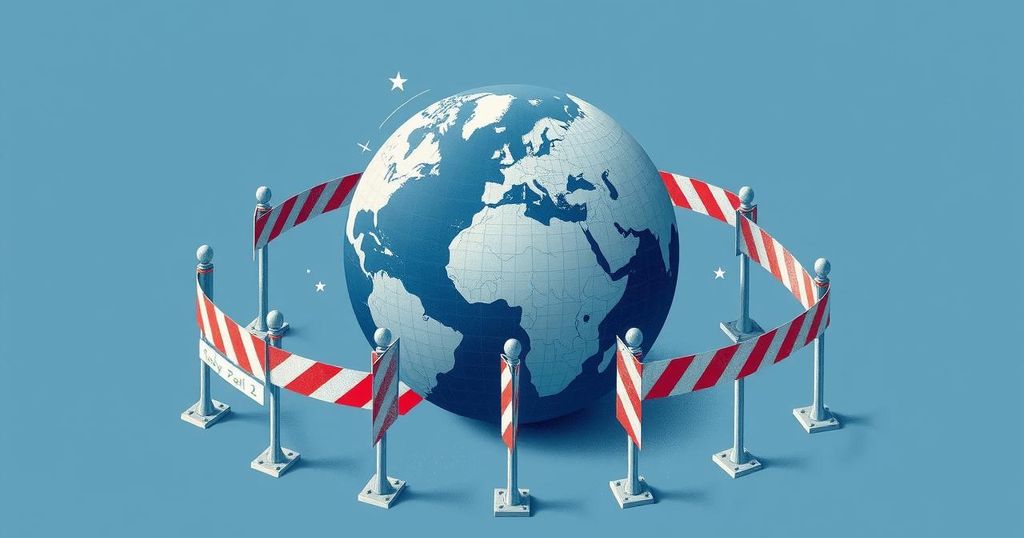World news
AMERICA, AMERICA FIRST, AND RETALIATORY TARIFF ORDERS, ASIA, BRETT SHUMATE, CHINA, DONALD TRUMP, JANE RESTANI, JUDICIARY, JUSTICE DEPARTMENT, MEXICO, NATIONAL SECURITY, NEW YORK, NORTH AMERICA, OREGON, POLITICS, SELECTIONS, SUPREME COURT RULING, TRUMP, UNITED STATES, US, US COURT OF INTERNATIONAL TRADE, VO, WHITE HOUSE
Oliver Grayson
0 Comments
Court Strikes Down Trump’s ‘Liberation Day’ Tariffs, Raises Questions on Executive Power
The U.S. Court of International Trade has invalidated Trump’s “Liberation Day” tariffs, questioning his authority to impose unilateral tariffs through emergency measures. The ruling limits executive power in trade policies and arrives amid lawsuits from businesses and states. The administration calls it judicial overreach, while pressure mounts to reassess trade strategies following these legal setbacks.
In a significant legal development, the U.S. Court of International Trade recently invalidated President Donald Trump’s controversial “Liberation Day” tariffs, raising questions about the administration’s authority to impose unilateral tariffs under emergency powers. The ruling is quite a setback for Trump’s ambitious trade agenda, which he has claimed was designed to counter unfair international trade practices and bolster domestic manufacturing.
The court’s ruling was strongly worded, indicating that Trump had exceeded his executive powers by using the International Emergency Economic Powers Act (IEEPA) to create broad tariffs. The judges stated that these actions were “contrary to law,” effectively blocking one of Trump’s major trade initiatives. In effect, the tariffs would have imposed significant impacts on global trade, emphasizing the administration’s unpredictable tariff strategy.
The White House did not take the ruling lightly and decried it as judicial overreach. A spokesperson stated, “It is not for unelected judges to decide how to properly address a national emergency.” They emphasized Trump’s commitment to putting America First, insisting the administration would continue to utilize executive powers to address economic challenges.
This court ruling follows two lawsuits filed in May by business interests, including VOS Selections, which claimed the tariffs adversely affected their operations. Additionally, twelve states, spearheaded by Oregon, joined in a lawsuit arguing that these tariffs would significantly inflate costs for essential goods purchased by government agencies. Concerns were raised that legal challenges could hinder U.S. negotiation strengths in the international arena.
During the proceedings in New York, Department of Justice representatives argued blocking the tariffs would disadvantage the United States in global negotiations. “An injunction would completely kneecap the president,” claimed Justice Department lawyer Brett Shumate, pointing out the potential fallout from the ruling.
Nonetheless, Judge Jane Restani firmly opposed this perspective, stating, “The court cannot for political reasons allow the president to do something he’s not allowed to do by statute.” The administration maintained that the tariffs were essential to counteract what they described as an ‘unusual and extraordinary threat’ to national security and the economy, citing the IEEPA as the legal basis for their actions.
In response to the ruling, the White House reiterated their stance, saying that nonreciprocal treatment by foreign nations contributed to historical trade deficits negatively impacting American communities and industries. However, the court asserted that the emergency statute does not allow the President to unilaterally impose tariffs without Congress’s approval, marking what some view as an unwarranted expansion of executive power.
Interestingly, amidst growing domestic and international pressures, the White House indicated that they were reevaluating some tariff measures and had even delayed a proposed 50 percent tariff on European imports after discussions with European Commission President Ursula von der Leyen.
In another development, the United States and China have tentatively agreed to mutually reduce tariffs for 90 days, a move that represents a temporary relief in ongoing trade hostilities. The agreement will provide exemptions for specific items like smartphones and certain high-tech electronics, pointing to a possible thaw in previously tense relations.
In summary, the U.S. Court of International Trade’s ruling against President Trump’s “Liberation Day” tariffs highlights a significant check on executive power regarding trade policies. The court’s assertion that such tariffs exceeded presidential authority under the IEEPA has forced the administration to reconsider its tariff approaches amid ongoing economic challenges and international pressure. The ruling, along with recent tariff negotiations with China and Europe, reflects a critical phase in U.S. trade relations.
Original Source: indianexpress.com




Post Comment